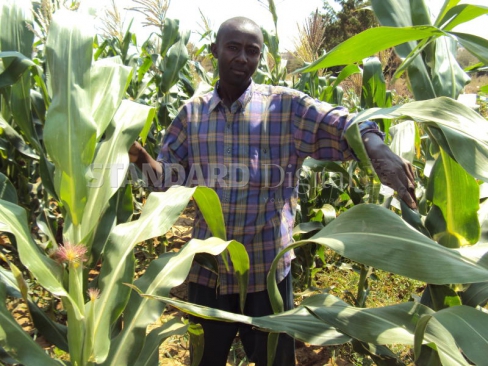When you mention Ukambani, one of the thoughts that come to mind is perennial water problems. This reality is a nightmare for most farmers. But one Philip Muthangya from Mboru Location, Mwingi South constituency in Kitui County has devised smart ways to beat the water problems and is thriving despite the many odds around him.
His four-acre farm is an ‘oasis’ dotted with healthy looking fruits and vegetables from mangoes, to onions, carrots, maize, oranges, passion fruits, spinach, kales, tomatoes and pawpaws. So how does he do all that despite the water issues? “Farming in a dry area is not for the faint-hearted. Over the years, I have been forced to dig several wells in my compound where I get water. Sometimes they dry up and I have to dig up more to sustain my venture,” says Muthangya.
Muthangya inter-crops and rotates crops in different segments to ensure they get sufficient nutrients. He says, “When l harvest maize from one section of the land, l replace it with another crop, say carrots or tomatoes and move maize to another area next time.” Born in 1974, Muthangya started farming in 1988, after completing Class Eight at Tyaa primary. He explains, “After primary school, l stayed at home for a year for lack of fees. Since going back to school was not an option, I ventured into small scale farming to earn a living.”
To start off his venture, he sold his father’s three goats and raised Sh5,000, which he used to purchase tomato seedlings and fertiliser. As expected, he faced several hurdles before he broke even. “During my first planting, almost half of the seedlings dried up because of lack of enough water. My neighbours laughed at me. But I never gave up,” he recalls. “It was a stressful period because every well l dug, dried up, and therefore I could not get enough water to irrigate the whole farm.” By the time he got his first harvest, around seven months later, only a quarter of the vegetables he planted were left. Some were destroyed by birds and rodents like mice and monkeys.
But that quarter harvest got ready market from locals because vegetables were on high demand. He made around Sh2,000. That encouraged him to go on. Muthangya then invested Sh1,000 in expanding the farm, replacing those that had weathered.
The farm picked up well after two years. Muthangya is now making good money from farming. He supplies his vegetables to local schools, churches, Mwingi market and to individuals. In a week, Muthangya harvests at least five crates of tomatoes with each crate fetching Sh1,500.
From tomatoes alone, he pockets Sh7,500 or more in a week. And, in total plus sales from other vegetables and fruits, takes home over Sh40,000 in a month. Since he irrigates his crops, his farm is ever green. He says, “I cultivate crops throughout the year. You can find crops at farm at anytime of the year.”
Today, he inspires even those who ridiculed him when he started farming. He now donates the surplus harvest to his neigbours who are widows and orphans. At the beginning of his farming activities, Muthangya relied on agricultural knowledge he studied in primary. But to manage his crops more, he’s been reading a lot of farming from magazines, books and newspapers.
Esther Mawia, his wife, manages the farm when he ferries the produce to the market. One of the biggest challenges he still faces is that sometimes he is forced to use a generator, which is expensive, to pump water to the farm.
He would also wish to have frequent visits by agricultural extension officers to help him on pest control. The farmer also has to deal with wild animals like monkeys that destroy his maize and thieves who steal his crops at night. He says, “I have lost a lot of my produce to thieves. At times, l am forced to guard the farm at night, which is risky.”
He also cites high fertiliser prices, seeds and pesticides which increases his overall expenditure. In future, Muthangya plans to invest in several green houses and become a major commercial exporter of vegetables and other farm produce.








